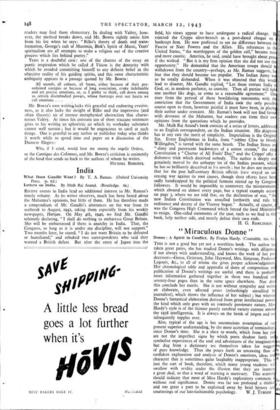Miraculous Donne " Donne : A Spirit in Conflict. By Evelyn
Hardy. (Constable. 'Gs. 6d Mrs is not a good but yet not a worthless book. The author ha taken great pains, she has studied Donne's writings with diligence if not always with understanding, and knows the work of her pre decessors—Gosse, Grierson, John Hayward, Mrs. Simpson, Professo Legouis, &c., to all of whom she gives proper acknowledgemen Her chronological table and appendix of dates of composition a publication of Donne's writings are useful, and there is probabl more information gathered together in these two hundred an seventy-four pages than in the same space elsewhere. Nor d this conclude her merits. She is not without sympathy and writ an elaborate, even affected prose (refreshingly unsullied 1:o journalese), which shows the influence of her subject ; but wherea Donne's fantastical elaboration derived from great intellectual power the kind which only goes with an intensely passionate nature, Mis Hardy's style is of the thinner purely cerebral variety current amou the 1938 intelligentsia. It is always on the brink of jargon and no infrequently topples over.
Also, typical of the age is her unconscious assumption of ou present superior understanding, by the mere acctetion of terminology since Donne's time. She is a slave to words, which from her p are not the imperfect signs by which poets shadow forth an t symbolise experiences of the soul and adventures of the imaginati but dug from a dictionary are themselves taken for nugge of pure knowledge. Thus she pours forth an unceasing flow confident explanation and analysis of Donne's emotions, ideas an character that is sometimes quite laughably inappropriate. This just the sort of book, therefore, which many young students wil swallow with avidity under the illusion that they are learnin a great deal, so that a word of warning is necessary. This warnm should indicate that most of Miss Hardy's explanatory comment without real significance. Donne was far too profound a think and too great a poet to be explained away by brief history an
smatterings of our late-fashionable psychology. W. J. TURNER


























 Previous page
Previous page